NO TIME TO DIE Countdown: DIAMONDS ARE FOREVER Revisited
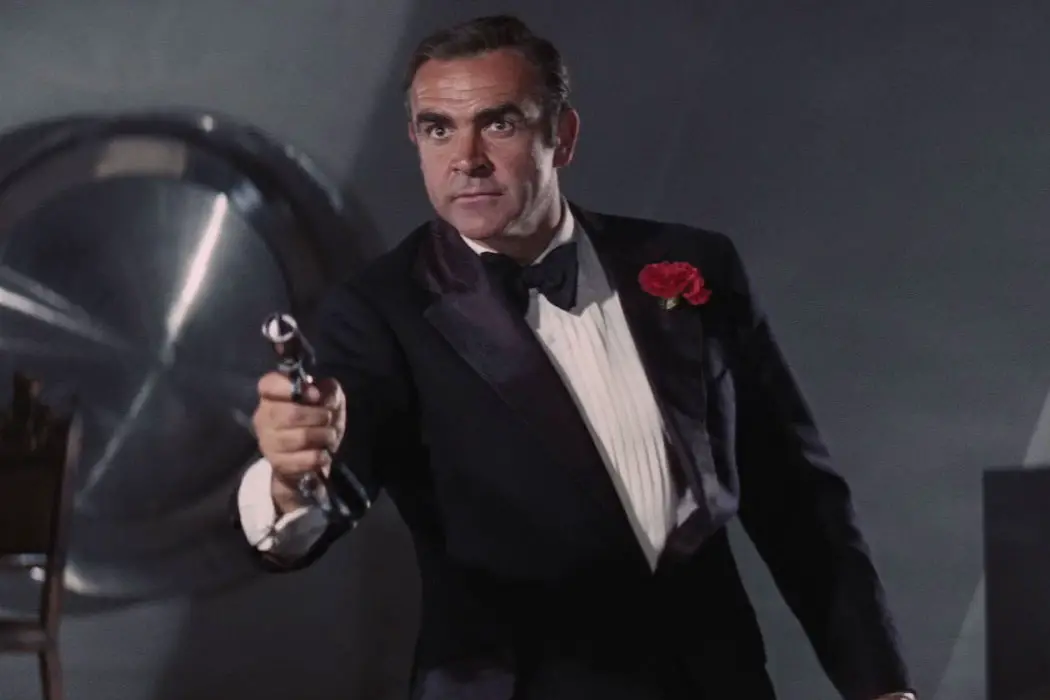
Movie lover & Los Angeles-based writer. BA in Film Criticism…
In the No Time To Die Countdown, Jake Tropila takes a look back at every Bond film – official and unofficial – in anticipation of the release of the latest entry.
Despite reaching an artistic apex with On Her Majesty’s Secret Service, George Lazenby could not bring himself to commit to a contract of five more movies, fearing Bond would immediately fall out of fashion and be deemed “uncool” as the world entered the hippie era of the 1970s. He bailed almost as soon as he got his foot in the door, leaving producers Albert R. Broccoli and Harry Saltzman back at square one. Whatever was a franchise to do?
The solution: Woo back original star Sean Connery with a then-record sum of $1.25 million (which he then later donated to charity), and place Goldfinger director Guy Hamilton back at the film to adapt Ian Fleming’s fourth novel. The result is Diamonds Are Forever, a patently bizarre adventure wherein Connery once again returns to fill the shoes that turned him into a global megastar. Sounds like a recipe for success, no?
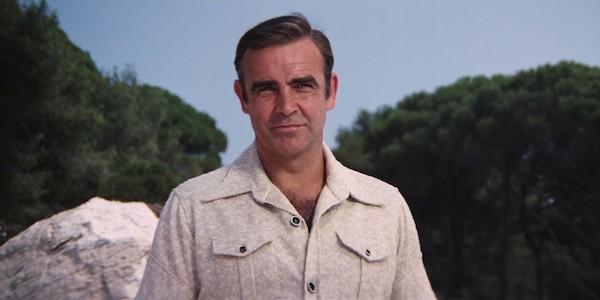
Here is where I deviate wildly from general fan consensus. Diamonds Are Forever has a reputation for being one of if not the worst James Bond film in the pack. It’s easy to see why: the visuals are exceedingly gaudy, the film frequently teeters into high camp, and Connery is practically comatose throughout. So why do I find myself loving it so damn much?
Thing is, Diamonds Are Forever is a whole lotta fun. And not in a guilty pleasure, so-bad-it’s-good kind of way. I mean fun in every sense of the word – I have a blast every time I watch it. This also might be the outright funniest Bond film in the canon, with a lot of genuinely comedic moments peppering this overtly goofy adventure. The silliness is quite intoxicating; let’s go back to 1971 and find out why.
REVENGE IS A DISH BEST SERVED BOILING
Diamonds Are Forever hits the ground running with Bond in hot pursuit for Blofeld, presumably to avenge Tracy’s death in the previous film. I say “presumably” because Tracy is never once mentioned by name here, and Bond’s temperament is less like that of a grief-stricken widower who lost the sincere love of his life and more like a guy who’s pissed that Blofeld cut him off in traffic. Funny thing, these continuities.
Anyways, we get our third incarnation of Blofeld in as many films. Here, he’s played by Charles Gray, who eagle-eyed viewers might recall also played Henderson, Bond’s initial contact in You Only Live Twice. Yes, the recasting makes no sense, but the film does take some lengths to explain why Blofeld looks drastically different: he’s undergone cosmetic surgery and is using this technology and his new appearance to build an army of Blofeld clones.
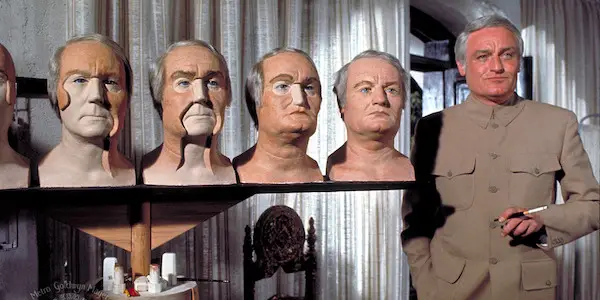
I can’t help but laugh at Bond’s lack of enthusiasm as he manages to dispatch one of the said clones by drowning him in a pool of boiling rejuvenation mud (don’t ask). That listless way Bond throws his hands in the air to “surrender” cracks me up every time. The ensuing title sequence brings Shirley Bassey back to the fold to deliver a song so nice that not even the naysayers can deny its greatness. I truly love this gentle ballad; while it does not feature Bassey in the belting mode of her Goldfinger days, she still performs admirably. John Barry’s score follows suit, turning in a strong offering that utilizes Bassey’s theme well.
With Blofeld seemingly out of the picture, Bond turns his attention to the new mission at hand: diamonds. An illicit diamond smuggling ring is taking place in South Africa, and professional assassin Peter Franks (Joe Robinson) is set to meet his contact operating part of the ring, Bond Gal Tiffany Case (Jill St. John). Bond poses as Franks to get an in with Tiffany and further investigate the smuggling ring.
It’s here we’re also introduced to our unusual and memorably off-beat henchman, Mr. Wint and Mr. Kidd (played by Bruce Glover, father of Crispin, and Putter Smith, respectively). These two assassins and ambiguously gay lovers have a knack for killing, but only with the most elaborate of methods, including poisoned by a scorpion, forcibly cremated, and even burial in a pipeline. I can’t help but get immeasurable joy every moment these two are onscreen.
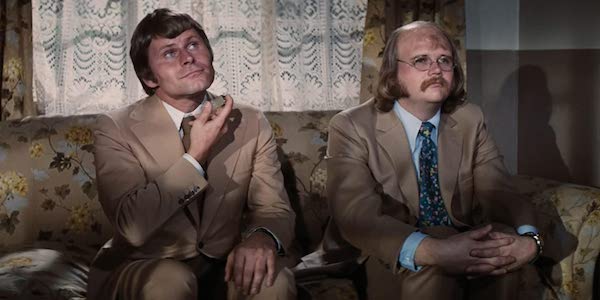
Even the haters must concede that Diamonds are Forever boasted one truly terrific set-piece: Bond’s brawl with Franks in a slow-moving lift. Harkening back to the legendary Red Grant fight, this is another scrap that is bruising and destructive in all the right ways, and it offers Connery the rare chance to come alive and relive the glory days of his younger, slimmer self. Good times.
ONE IS NEVER TOO OLD TO LEARN FROM A MASTER
Diamonds Are Forever is one of the few Bond films to remain stateside for much of the running time. The primary location here is Las Vegas, captured in all of its 70s gaudy glory. Hamilton uses the strip and desert to his advantage, somehow staging both a car chase and a moonbuggy chase within the 24-hour period (keep an eye out for the extras watching the production on the sidelines in the former). Land, sea, or air, Bond certainly keeps busy.
Here is where I will make my case for Diamonds Are Forever as an intentional comedy. Bond’s sleuthing takes him to an underground research facility, which involves a satellite-powered by diamonds. He’s discovered and makes his way to the neighboring soundstage, where a taping of the moon landing is taking place. The guards yell at actors portraying the astronauts to apprehend Bond, and without breaking character, proceed to approach Bond in complete slow motion, as if they were still affected by the moon’s gravity. It’s a bit that is so comedically inspired that I can only assume it, along with the rest of the movie, was done on purpose.
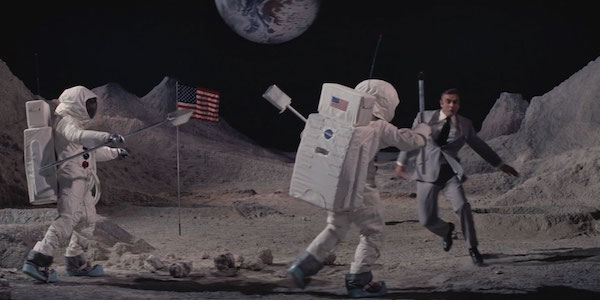
As far as Bond Girls go, Tiffany Case has an unusually regressive arc. Her introduction to Bond is fabulously slinky, all undergarments and alternating wigs (“So long as the collars and the cuffs match,” quips Bond), but she still remains very much in control of the situation. Very rarely does the Bond Girl often get to be the mastermind behind a villainous diamond smuggling plot. However, as the film progresses, Tiffany gets cruelly dumbed down into someone who is barely competent. The Tiffany at the end of the film is clearly not who she was at the start.
Felix Leiter also shows up and doubles as a Bond Ally. He’s played here by Norman Burton, which makes him Felix Number Four, for those keeping score at home. There’s a secondary Bond Girl to contend with as well, in the form of opportunistic Plenty O’Toole (Lana Wood). She’s onscreen for less than five minutes, but is featured in one of the film’s highlights: while commencing a tryst with Bond, she’s grabbed by some gangsters and thrown out of the window of the hotel room, landing safely in the pool below. “Exceptionally fine shot,” remarks Bond. “I didn’t know there was a pool down there,” replies the goon. Ho ho.
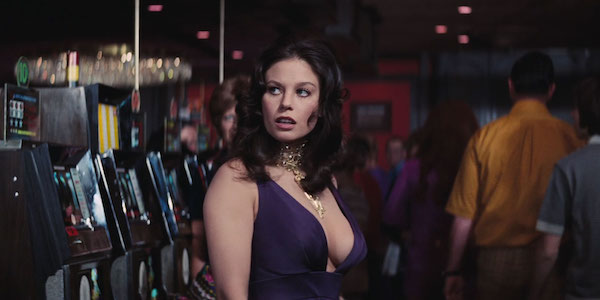
Blofeld’s scheme is proper dastardly, but the machinations behind it are unnecessarily convoluted. To make any advancements, he’s kidnapped Willard Whyte (played by Jimmy Dean of Jimmy Dean Sausage), entrepreneur and hotel magnate, and is posing as him in his hotel penthouse to set his plot in motion, which involves using the diamond-powered laser satellite (which is controlled by a normal cassette on earth) to remotely detonate nuclear bombs around the globe.
As daffy as Diamonds are Forever is, it horribly underplays the damage caused by Blofeld’s plans. He successfully manages to detonate nukes in China, the Soviet Union, and the United States, but the casualties or fallout are never made clear (we see three flaming soldiers, tops). All this in a film with two gymnast henchman called Bambi and Thumper – I’ll admit this is not the most tonally consistent of Bond films but is a little more concern for the millions of innocence that perish too much to ask?
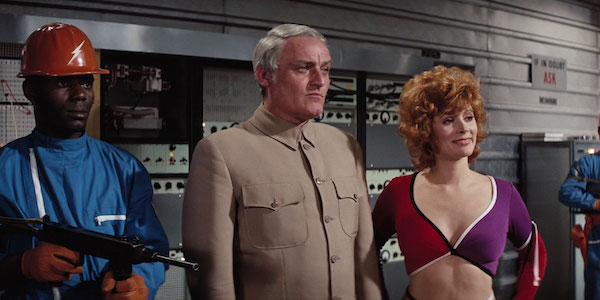
The climax of Diamonds Are Forever takes place on an oil platform off the coast of Baja California. Bond makes his way aboard, and with a bit of luck (and some fumbling from Tiffany) he manages to dismantle Blofeld’s plan before seemingly killing Blofeld in a vague crane death. I say “seemingly” because Blofeld does not appear in any future Bond films during the next few eras, all due to the rights issues initiated by Kevin McClory (see my Thunderball entry for more details). Thus, Diamonds Are Forever ends the reign of Blofeld and SPECTRE.
CONCLUSION
Following Blofeld’s comeuppance, Bond summarily dispatches Mr. Wint and Mr. Kidd in the final moments of the film, using a pair of flame skewers and a cake bomb (don’t ask). This also brings Connery’s official tenure as Bond to a close (yes, there will be another “unofficial” entry coming, all in due time). Everybody has their favorite actor, but I think few can dispute Connery as the best. It’s difficult to start a franchise from nothing; Connery succeeded with flying colors and made it look cool, thrilling, and fun in the process. We have him to owe for successfully translating the character of Bond to the big screen; if only he were allotted a proper exit. Diamonds Are Forever might not be the greatest showcase for Connery’s talents, but it’s still an enjoyable outing in its own right, one that values humor over thrills.
Coming up next: we get a new Bond! Hopefully, this one sticks around for more than one film. The No Time To Die Countdown will return with Live and Let Die.
What do you think? Does Diamonds are Forever’s place in the canon that deserve to be reevaluated?
Watch Diamonds are Forever
Does content like this matter to you?
Become a Member and support film journalism. Unlock access to all of Film Inquiry`s great articles. Join a community of like-minded readers who are passionate about cinema - get access to our private members Network, give back to independent filmmakers, and more.
Movie lover & Los Angeles-based writer. BA in Film Criticism & Media Theory from CSU Northridge. Unofficial Bond ally. Rhymes with “tequila.”












